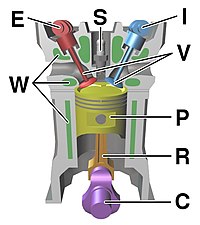
Photo from wikipedia
Abstract The present work describes the elaboration of a predictive tool consisting on a phenomenological multi-zone model, applicable to the simulation of HCCI combustion of both diesel and biodiesel fuels.… Click to show full abstract
Abstract The present work describes the elaboration of a predictive tool consisting on a phenomenological multi-zone model, applicable to the simulation of HCCI combustion of both diesel and biodiesel fuels. The mentioned predictive tool is created with the aim to be applied in the future to perform engine characterization during both pre-design and post-design stages. The methodology applied to obtain the proposed predictive model is based on the generation of an analytical mechanism that, given a set of regression variables representing the engine operative conditions, provides the user with the optimal figures for the scaling coefficients needed to particularize both the ignition delay and the heat release rate functional laws, which rule the combustion development in the proposed multi-zone model for HCCI engines. The validation of the proposed predictive multi-zone model consists on the comparison between chamber pressure curve derived from the simulations and experimental data based on a DEUTZ FL1 906 unit modified in order to allow HCCI combustion operation mode using diesel EN590 and rapeseed biodiesel. Finally, evidences of the capabilities of the proposed model to be used as a predictive tool applicable to the analysis of off-road engines under HCCI conditions are provided, consisting in the characterization and optimization of the operational maps related to both Brake Specific Fuel Consumption and NOx emissions.
Journal Title: Journal of The Energy Institute
Year Published: 2017
Link to full text (if available)
Share on Social Media: Sign Up to like & get
recommendations!